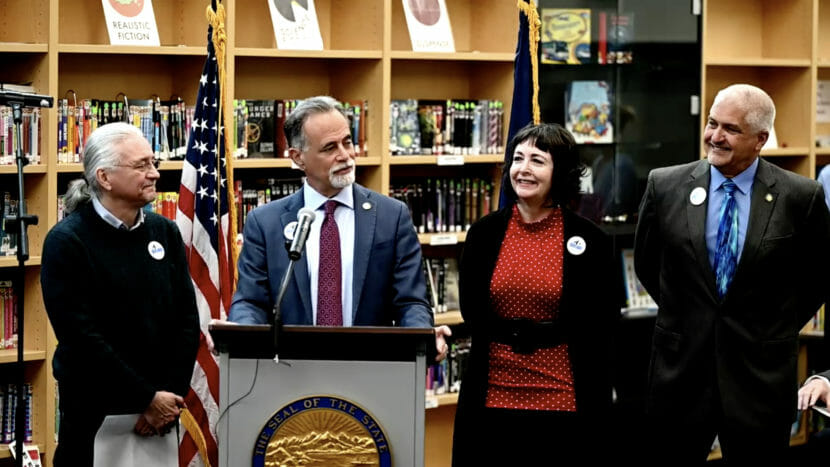
Gov. Mike Dunleavy and state legislators celebrated the passage of the Alaska Reads Act on Tuesday in Anchorage.
The act aims to improve student reading outcomes across the state by third grade. It provides funding for pre-K programs, uses reading screeners to identify students falling behind and gives grants to low-performing districts. It also requires districts to develop individual reading improvement plans for students who need additional help.
Dunleavy and Sen. Tom Begich, an Anchorage Democrat, first proposed the Alaska Reads Act two years ago. At a press conference at Turnagain Elementary School, Dunleavy said it was a bipartisan effort.
“When you’re dealing in the world of politics like we do, oftentimes politics gets in the middle of things,” he said. “But every once in a while, there’s a moral imperative people get around.”
The bill narrowly passed the House in the final hours of the legislative session. At the press conference, Senate majority leader Peter Micciche said the types of reading interventions funded in the bill helped his own daughter.
“I have one daughter that struggled with reading, and the Kenai Peninsula Borough School District already had intervention in place,” he said. “She’s a straight-A student in eighth grade right now, doing very well, and it was because of that intervention that is designed into this bill that brought her to a place where she can excel.”
Some rural legislators were skeptical about the bill. At a House floor session in May, Dillingham independent Rep. Bryce Edgmon called the $30 increase to the base student allocation, the amount of money per student a district receives, “a joke.” He said hiring reading intervention specialists would be a challenge for rural districts, where recruiting and retaining teachers is already difficult.
“This bill does not help rural Alaska,” he said. “If you were to write a bill for big schools, I would write it just like this.”
Third graders who receive low scores on the reading screeners could be held back a grade, according to the bill.
Bethel Democratic Rep. Tiffany Zulkosky said teachers and parents should make that decision, not the state.
“My concerns are rooted in the protection of small schools, Alaska Native children, Alaska Native language speaking students, that such an onerous policy would unintentionally disadvantage these groups to their peers,” she said.
At the press conference, Anchorage Democratic Rep. Chris Tuck said that while the bill doesn’t solve every problem in Alaska’s education system, it directs funds to important areas like an increased base student allocation and loan forgiveness for some teachers.
“This bill doesn’t solve everything, but it really puts money right where a lot of our other problems will be solved,” he said.
The bill unanimously passed the Senate and passed the House in a 21-19 vote. Dunleavy is expected to sign the bill into law in the coming weeks.
[Sign up for Alaska Public Media’s daily newsletter to get our top stories delivered to your inbox.]



